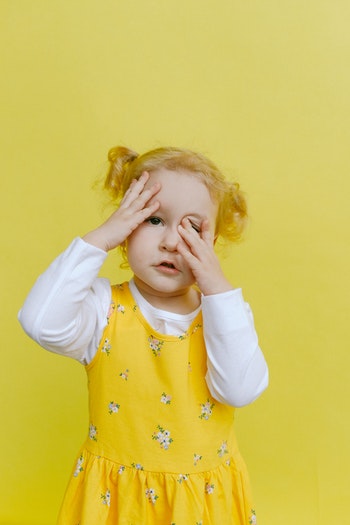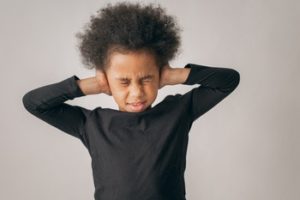
Anxiety is best described as a feeling of unease or worry, sometimes unrelated to a specific cause. With adults, there could be several stressors that cause anxiety and distress, but identifying the same in children can be a lot more difficult. Children can experience anxiety over a wide range of things without understanding why they feel the way they do. Their inability to recognize and vocalize the r oot of their discomfort makes it harder for parents to help them ahead of time. The first step in treating children with anxiety is to identify the major and minor triggers that could be offsetting them.
oot of their discomfort makes it harder for parents to help them ahead of time. The first step in treating children with anxiety is to identify the major and minor triggers that could be offsetting them.
Symptoms to look out for
- Irritability and change in behavior – Children might not be able to voice out their anxiety, but they will tell you in other ways. If you notice significant changes in their body language and behavior, your child might be in distress.
- Change in appetite, frequent bathroom visits, and temperamental outbursts – If these signs have persisted for a while and show no indication of reducing, it could be an effect of anxiety. Stress can greatly affect our day-to-day activities and result in maladaptive coping mechanisms identified as above.
- Extreme fear around people, situations, or things – As there are many types of anxiety, social anxiety and separation anxiety might be common among children with attachment issues. These symptoms might reflect through an aversion to being alone or in unfamiliar social settings.
- Inability to control emotional reactions – Crying uncontrollably, excessive mood swings, or otherwise behaving out of character could be another telltale sign of anxiety. If the child’s emotional reaction to unidentifiable triggers is severe, they could be in need of a professional diagnosis.
Though these are only a handful of possible signs, it’s important to distinguish them from normal feelings of fear. Anxiety in children is more so associated with extreme feelings of fear that affect their daily activities and lead to maladaptive behavior. In most cases, anxiety disorders are diverse and can relate to one or a group of related issues. Since identifying these signs on your own can be challenging, scheduling a consultation with your doctor is advisable. With several options, from a physical visit to online therapy at your disposal, it’s best to get a professional opinion at the earliest.
Possible treatments to explore
Doing your own research before committing your child to any treatment plan is always a wise approach. Depending on your area, most schools offer various resources to identify and address anxiety in children. Schools in Littleton and Lakewood offer specific workshops and resources for parents and children to help mitigate anxiety. Some schools in Westminster also share resources on anxiety-related concerns in children that could be of help before consulting a specialist. Besides schools, a handful of cities in Colorado offer interesting approaches to anxiety treatment for children. Play therapy, popular in Denver, is known to be a fun and exciting way to engage kids in the treatment process. Similarly, there are several other child-centered therapy options to choose from across the state. Cognitive Behavioral Therapy (CBT) is another well-known measure in the treatment of children with anxiety. The treatment involves gradual exposure to common triggers the child experiences until they are fully desensitized to it. For this reason, CBT is known to have a high rate of efficacy, especially among children.
Getting the right help
Once you identify the severity of your child’s anxiety, establishing your next plan of action becomes a lot simpler. If your child does not experience extreme symptoms but still feels moderately fearful, a  few home-based coping mechanisms can be applied. With the example of yoga, breathing exercises, and art therapy, you could engage your child creatively without professional support. However, these measures should only be used as a stopgap solution depending on the case at hand. Given the unpredictable nature of anxiety, the safest option is to seek a consultation with a licensed professional. If investing in mental health services is over your budget, the best solution is to approach your health insurance provider for their mental health cover. Providers like Kaiser Medicare and Humana are known to offer a wide range of mental health services across locations. Insurance plans from Humana also help you gain access to a wide pool of local CBT therapists in Arvada, Aurora, and many other parts of Colorado. If identifying the right therapist for your child is confusing, Kaiser also offers a variety of resources on how to find the right match. Based on your situation, location, and convenience, you can plan your therapy sessions accordingly.
few home-based coping mechanisms can be applied. With the example of yoga, breathing exercises, and art therapy, you could engage your child creatively without professional support. However, these measures should only be used as a stopgap solution depending on the case at hand. Given the unpredictable nature of anxiety, the safest option is to seek a consultation with a licensed professional. If investing in mental health services is over your budget, the best solution is to approach your health insurance provider for their mental health cover. Providers like Kaiser Medicare and Humana are known to offer a wide range of mental health services across locations. Insurance plans from Humana also help you gain access to a wide pool of local CBT therapists in Arvada, Aurora, and many other parts of Colorado. If identifying the right therapist for your child is confusing, Kaiser also offers a variety of resources on how to find the right match. Based on your situation, location, and convenience, you can plan your therapy sessions accordingly.
Trust the process
Coming to terms with and managing your child’s anxiety can feel overwhelming. Much like any other illness, anxiety takes time to heal and recover from. While it can induce feelings of helplessness among parents, it’s not something to fear entirely. With patience and the right care, you and your child will overcome the worst.


